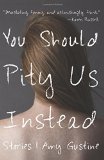Summary | Excerpt | Reading Guide | Reviews | Beyond the Book | Readalikes | Genres & Themes | Author Bio

 Book Reviewed by:
Book Reviewed by:
Rory L. Aronsky
Buy This Book
From "All the Sons of Cain"
After they find out where she lives, they start coming every week, sometimes every day. Wednesday morning they come especially early, waking her. R's mother stays in bed, yearning for coffee and the bathroom, but fearful of nearing the window. She knows what she'll see below: her son's scrawny face imprinted on cheap poster board, hoisted on stave and dowel by protesters who misspell his name. Sometimes they use him to protest another prisoner trade, sometimes to support it; sometimes to urge settlements, other times to condemn those already built; to push for a two-state solution or to warn against it. Once they were protesting a tax, another time something to do with toilets. R's mother doesn't want to know what they're using her son for today. Reconciliation and revenge. Hostages and prisoners. Murderers and soldiers. It all sounds the same from up here.
She turns to the wall and pulls the blanket over her shoulder. Retired from her job as a nurse, she has nothing to do but think of R. What she thinks is that he's already dead. If not today, then tomorrow, or next year. And if we're sure to die, then aren't we already gone? Only time intervenes, and what is time? If you were a rock, there would be no time. Rocks do not die. It occurs to her symbols don't die either. As a symbol—inert, permanent—her son still matters.
Sitting up, she looks toward the street-side window. She ought to love the protesters. Whatever they're protesting for, they're keeping her son in people's minds. But she can't love them. She doesn't give a damn about them.
R's mother lies back down. What is the math of a mother's love? Infinity, she thinks. She would let everyone in the world burn for him. Including, and especially, Gilad Shalit.
They took R after Shalit, Israel's common son, came home in exchange for 1,027 Palestinian prisoners. Terrorists, some say. Freedom fighters to others. Regardless, Hamas wanted more. It was six months ago that they grabbed R under cover of tear gas near the Gaza border. The pain of his capture has not attenuated. Instead, it is like a cancer swimming through her veins to plant pieces in every pocket of self: her eyes, her ears, her taste, her dreams.
R's mother is sliding against the wall, staying clear of the window on her way to the bathroom, when something smacks the outside of the building. Enraged, she rushes toward the window, about to yell "bomb" just to make them stop jousting with his face. That face, that name, belong to her. To hell with them. But before she can speak, a few words break free of the crowd. Muslim. Tape. Proof.
She slams the window and turns on the TV, channeling past women singing and a show about desert climates to a local news program. Hamas has released a videotape of R in which he claims to be converting to Islam. His mother barely registers these words. She is staring at the newspaper her son holds, a British paper dated just last week.
The possibility that an Israeli soldier is becoming a Muslim takes hold of the country. The protests become larger, the pundits more strident. One morning R's mother is watching a local channel broadcasting a protest outside her own window. A banner, painted in slurred red letters, reads: "A Jew is worth a thousand Muslims. A traitor is worth a thousand deaths."
She finds a pair of scissors and cuts the TV's power cord.
For a month she doesn't go out, doesn't answer the phone, doesn't read the newspaper or turn on the radio. A boy in the building goes to the market for her, a boy who can be counted on never to ask how she's feeling or what she thinks about the tape. Like a prisoner herself—a prisoner of uncertainty, of history, of other people's prejudice—she spends her time reading old novels, their familiar stories a great comfort. No more surprises.
Excerpted from You Should Pity Us Instead by Amy Gustine. Copyright © 2016 by Amy Gustine. Excerpted by permission of Sarabande Books. All rights reserved. No part of this excerpt may be reproduced or reprinted without permission in writing from the publisher.





The House on Biscayne Bay
by Chanel Cleeton
As death stalks a gothic mansion in Miami, the lives of two women intertwine as the past and present collide.

The Flower Sisters
by Michelle Collins Anderson
From the new Fannie Flagg of the Ozarks, a richly-woven story of family, forgiveness, and reinvention.

The Funeral Cryer by Wenyan Lu
Debut novelist Wenyan Lu brings us this witty yet profound story about one woman's midlife reawakening in contemporary rural China.
Your guide toexceptional books
BookBrowse seeks out and recommends the best in contemporary fiction and nonfiction—books that not only engage and entertain but also deepen our understanding of ourselves and the world around us.